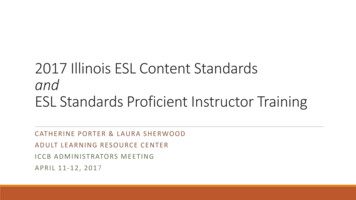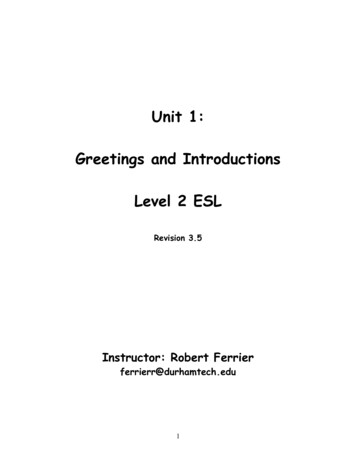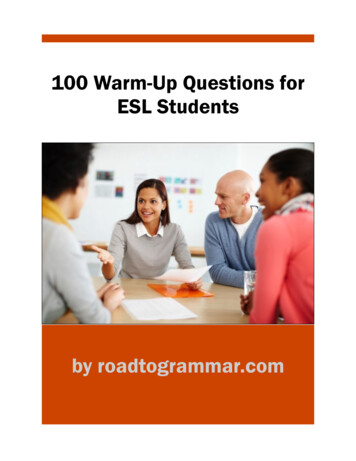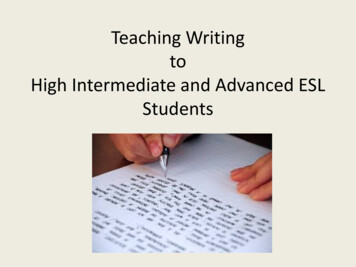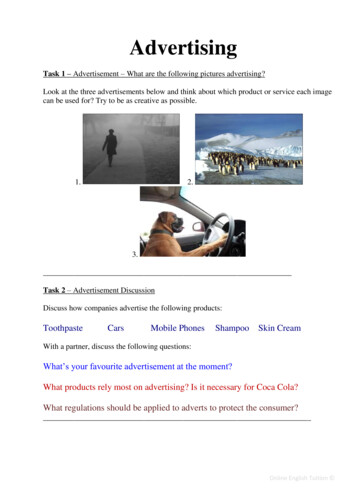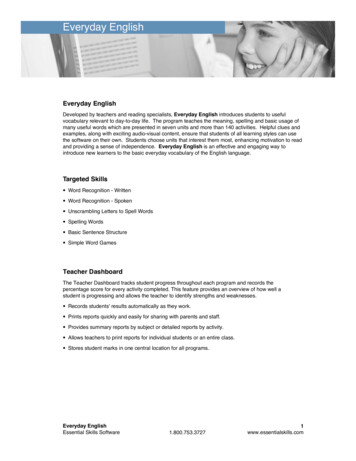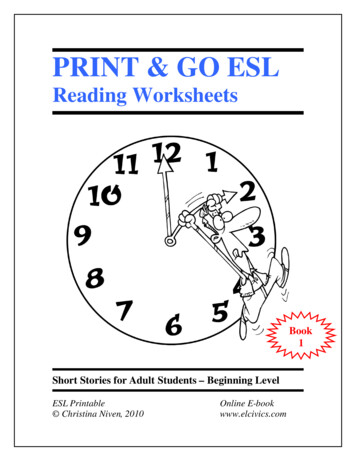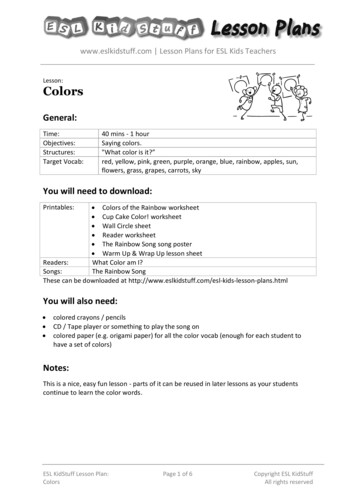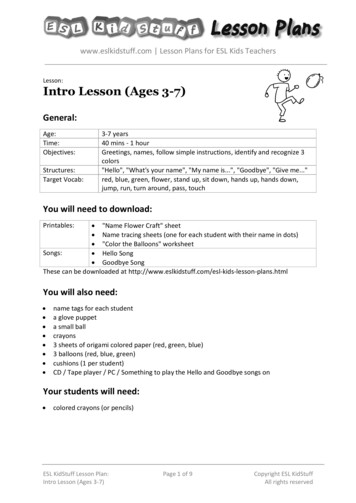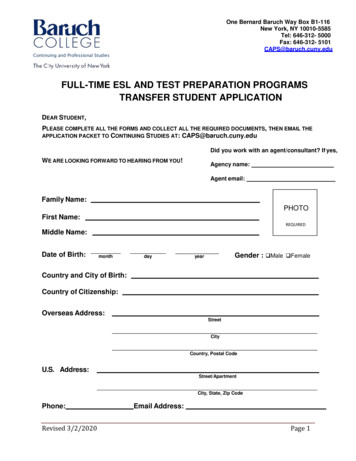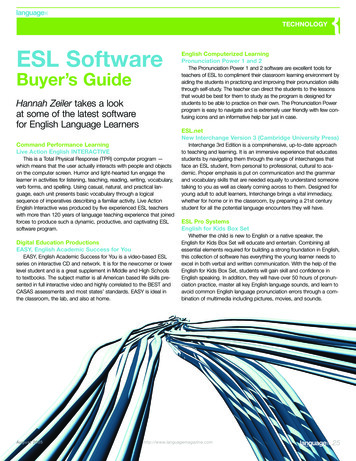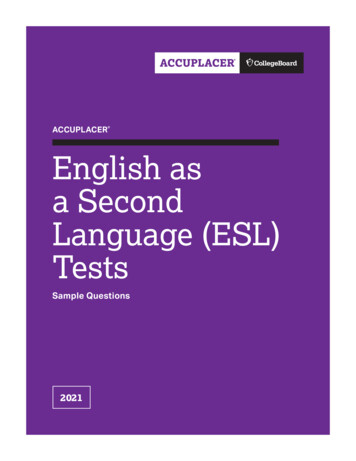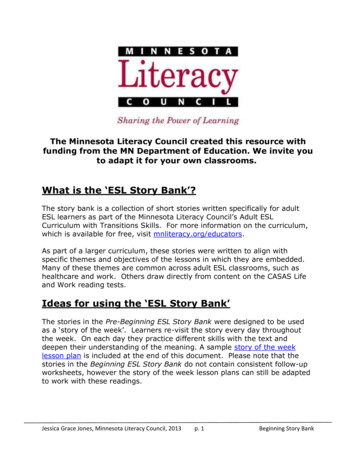
Transcription
The Minnesota Literacy Council created this resource withfunding from the MN Department of Education. We invite youto adapt it for your own classrooms.What is the ‘ESL Story Bank’?The story bank is a collection of short stories written specifically for adultESL learners as part of the Minnesota Literacy Council’s Adult ESLCurriculum with Transitions Skills. For more information on the curriculum,which is available for free, visit mnliteracy.org/educators.As part of a larger curriculum, these stories were written to align withspecific themes and objectives of the lessons in which they are embedded.Many of these themes are common across adult ESL classrooms, such ashealthcare and work. Others draw directly from content on the CASAS Lifeand Work reading tests.Ideas for using the ‘ESL Story Bank’The stories in the Pre-Beginning ESL Story Bank were designed to be usedas a ‘story of the week’. Learners re-visit the story every day throughoutthe week. On each day they practice different skills with the text anddeepen their understanding of the meaning. A sample story of the weeklesson plan is included at the end of this document. Please note that thestories in the Beginning ESL Story Bank do not contain consistent follow-upworksheets, however the story of the week lesson plans can still be adaptedto work with these readings.Jessica Grace Jones, Minnesota Literacy Council, 2013p. 1Beginning Story Bank
How to navigate the ‘ESL Story Bank’Below is a table listing possible unit themes for adult ESL and correspondingstories. Some stories have both a pre-beginning (low literacy) version aswell as a beginning (CASAS/SPL level 2-3) version. Where you see bluehyperlinks, you can click on the story title to jump directly to that story andcorresponding worksheets. All pre-beginning stories are in the PreBeginning ESL Story Bank and all beginning level stories are in the BeginningESL Story Bank.In the table, under the title of each story, there are suggestions for possiblephonics instruction on individual phonemes or spelling patterns. For moreinformation, see the sample story of the week lesson plan at the end of thisdocument.Unit/ThemesLooking for WorkWork HistoryOn-the-job instructionsWork safetyPre-BeginningBeginningMax Has a JobWord Family: -an (man, can, ran, fan)Max’s Many JobsMax Works HardWord Family: -ook (look, took, book, cook)Word Family: -uck (truck, buck, luck, stuck)Target Phonemes: letter x /ks/Target Letter/Sound: T or /k/ -multiplespellings (c, k, -ck) with exceptions school andofficeDid you Clock In?Did You Clock Out?Target Letter/Sound: DTalking on the PhoneHealthFamilyMy Daughter is SickHealthBody partsGoing to the clinicMr. White is SickMy Daughter is SickTarget Letters/Sounds: LWord family: -ick (sick, lick, quick, pick)Target Letters/Sounds: H or SJessica Grace Jones, Minnesota Literacy Council, 2013p. 2Beginning Story Bank
FamilyEmotionsMr. White Goes to the ClinicRalph Goes to the ClinicWord family: -ee (see, tree, three, bee)Target Letters/Sounds: D, H, S, or WTarget Letters/Sounds: PH -/f/Lora’s FamilyTarget Letters/Sounds: er spellingLora’s PicturesWord Family: -ay (day, pay, lay, say)Target Letters/Sounds: L, M, D, S (not sh), THShoppingFamilyClothingColorsWhere Is My Shirt?Word Family: -ish (fish, dish, wish)Work family: -ook (look, book, took, cook)Target Letter/Sound: SHThe Perfect DressThe Perfect DressTarget Letter/Sound: BWord family: -ack (black, back, sack, pack,rack)Target Letter/Sound: BHousingFamilyFire SafetySchoolFamilyEmergency contactHealthAn Apartment for TwoWord family: -an (man, van, ran, can)Target Letters/Sounds: B, M, and THI Can’t SleepI Can’t SleepWord family: -all (call, hall, mall, ball)Target Letters/Sounds: M, L or NTarget Letters/Sounds: M or ARHurt at SchoolHurt at SchoolWord Family: -un (run, bun, fun, sun)Target Letters/Sounds: Spellings of /ɝ/: (ir, er,ur)Target Letters/Sounds: Spellingsof /ɝ/: (ir, er, ur)Jessica Grace Jones, Minnesota Literacy Council, 2013p. 3Beginning Story Bank
TransportationMoneyShoppingHomeCar ProblemsCar ProblemsWord Family: -old (cold, old, fold, told, sold)Target Letters/Sounds: -INGTarget Letters/Sounds: -INGThe Right BusWord Family: -et (get, let, jet, pet)Word Family: -it (sit, fit, hit, zit)Word Family: -ot (not, got, hot, pot)Target Letters/Sounds: P or SThe Right BusTarget Letters/Sounds: ch/-tchA New BedWord Family: (small, fall, tall, wall)Word Family: (man, pan, fan, ran)Word Family: (king, ring, sing, wing)Target Letters/ Sounds: N, T, W or BA Problem at the StoreA Problem at the StoreWord Family (day, pay, say, way)Word Family (truck, duck, suck, yuck)Word Family (wrong, long, song, gong)Target Letters/Sounds: G, N, or TTarget Letters/Sounds: multiplespellings of /k/ (c, k, -ck)Daily ActivitiesWorkTimeSchedulesRachel is BusyRachel’s WeekWord Family (old, cold, told, sold)Word Family (all, call, fall, tall)Word Family (talk, walk, chalk)Word Family (day, pay, stay, way)Target Letters/Sounds:/f/ -exception “of”/r/ -NOT r-controlled vowels (ir, er, ar, ur, or)/t/ -watch out for TH exceptions/w//th/Target Letters/Sounds: RCommunityWorkDirectionsMapsFresh FishFresh FishWord Family (smells, sells, tells, bells)Target Letter/Sound: SHTarget Letter/Sound: SHPlaces in the CityA Wrong TurnTarget Letters/Sound: URWord Family (bank, tank, sank, thank)Jessica Grace Jones, Minnesota Literacy Council, 2013p. 4Beginning Story Bank
Word Family (far, bar, car, jar)Word Family (park, dark, bark, shark)Target Letters/Sounds: K, L, N, S (watch outfor some words with SH)SignsCommunitySeeing SignsWord Family (tells, bells, fell, sell)Word Family (stop, cop, pop, mop)Target Letters/Sounds: D, M, P, T, WFoodCookingThe Kitchen Is BusyThe Kitchen Is BusyWord Family (cook, look, book, took)Word Family (beans, jeans, means, cleans)Word Family (can, man, ran, van)Target Letters/Sounds: Contrasting sounds /p/and /b/Jessica Grace Jones, Minnesota Literacy Council, 2013p. 5Beginning Story Bank
Max Works HardLook at the picture.What are their jobs? Where do they work? Are you a hard worker?Max is a hard worker. Max has had many different jobs. In 1996, he tookhis high school exam when he was sixteen. After that he started working.First, he was a packager in a factory. He put things in boxes and put theboxes on a truck. He worked in the factory from 1996 to 2000.Next, he was a custodian in a school. He cleaned and waxed the floors. Hetook out the trash. He fixed the toilets and the lights. He was a custodian from2000 to 2008Then, he moved to Texas. He started working in an office. Now he is anoffice worker. He answers the phone. He gives faxes to people in the office.Jessica Grace Jones, Minnesota Literacy Council, 2013p. 6Beginning Story Bank
Max Works HardWrite YES or NO.1.1. Max was a packager for 3 years.2.2. Max’s first job was in a factory.3.3. Max finished high school.4.4. Max moved to Iowa.5.5. Max was a custodian for 8 years.Write the answers.6. Where does Max work now?7. When did he start working in the factory?8. How long did he work at the school?Write one question about the story. Ask a partner the question. Write theanswer.9.Words I don’t understand:WORD:MEANING/PICTURE:Jessica Grace Jones, Minnesota Literacy Council, 2013p. 7Beginning Story Bank
Did You Clock Out?Abdi works in food service. He prepares fruits and vegetables forrestaurants, hospitals, and nursing homes. Every day he peels, cuts, and bagsfruits and vegetables.Abdi thinks peeling and cutting vegetables is easy. But the manager tellsAbdi there are other things he must remember, too.Last week, the manager watched Abdi work. He asked him many questionsabout his job.MANAGER: Did you clock in before you started?ABDI:Yes, I did.MANAGER: Did you wash your hands and put on clean gloves?ABDI:I’m sorry. Can you repeat that please?MANAGER: Did you wash your hands?ABDI:Yes, I washed my hands.MANAGER: Did you put on clean gloves?ABDI:Yes, I put on clean gloves.MANAGER: Did you wipe off the counter when you finished choppingcarrots?ABDI:Did I wipe off the counter? Yes, I wiped off the counter.The manager was very happy that Abdi could answer all the questions inEnglish. The manager wrote everything on a paper. The manager said maybeAbdi will get a raise in the future.Jessica Grace Jones, Minnesota Literacy Council, 2013p. 8Beginning Story Bank
Did You Clock Out?Circle True or False.1. Abdi is a cook.TF2. Abdi is a good worker.TF3. Abdi wiped off the counter.TF4. The manager asked Abdi some questions.TF5. Abdi washed his gloves.TF6. Abdi works in a hospital.TF7. Abdi clocked outTFWrite the answers.8. What did Abdi do after he cut the carrots?9. What did Abdi do before he started working?10. What did Abdi say when he didn’t understand?Jessica Grace Jones, Minnesota Literacy Council, 2013p. 9Beginning Story Bank
My Daughter is SickThe little girl wakes up in themorning.The little girl is sick.She has a headache.She has a fever.She has a stomachache.Her mom takes her temperature.The little girl goes to UticaElementary School.She is in third grade.Today she can’t go to school.Jessica Grace Jones, Minnesota Literacy Council, 2013She needs to stay in bed all day.Her mother calls the school to leave amessage.She listens, then pushes buttonnumber 1.p. 10Beginning Story Bank
My name isLora Smith.I am callingabout mydaughter.The mother waits for the beep.Then she says her name.She says that she is calling about herdaughter.She is inthird grade.Her teacheris Mrs. Lee.Her name isKate Smith.It is spelledK-A-T-ES-M-I-T-H.The mother says her daughter’sname.She spells her daughter’s name.She speaks loudly and slowly.Today shehas a fever.She will goto schooltomorrow ifshe feelsbetter.The mother says her daughter’sgrade.The mother says her daughter’sproblem.She says her daughter’s teacher.She says when she will come back toschool.Jessica Grace Jones, Minnesota Literacy Council, 2013p. 11Beginning Story Bank
My phonenumber is(651)3972296.Thank you.The mother says her phone number.She says thank you, and hangs up the phone.The school office will tell the teacher that Kate Smith is sick today.Answer the questions about the story.1. What is the daughter’s name?2. What is the mother’s phone number?3. Where does Kate go to school?4. What is her teacher’s name?5. Why will Kate stay home today?6. Do you think it’s good for parents to call their child’s school?Why?Adapted from AndreaEchelberger, MLC, 2012Jessica Grace Jones, Minnesota Literacy Council, 2013p. 12Beginning ESL Story Bank
Ralph Goes to the ClinicLook at thepictures.What are theydoing?Where is hegoing?Do you go tothe clinic?What is thename of yourclinic?Ralph is sick. He has a bad headache. He can’t sleep at night. He goes tothe clinic to see his doctor. The name of his clinic is Blaine Medical Center.Ralph opens the door. The receptionist is busy. She is on the phone. Ralphwaits.“I can help you now,” says the receptionist.“My name is Ralph White,” he says.“ Are you a new patient?” she asks.“No, I have been here before,” he says.Ralph waits in the waiting room. Finally, he goes to see the doctor. A nurseasks him questions and takes his blood pressure.Jessica Grace Jones, Minnesota Literacy Council, 2013p. 13Beginning ESL Story Bank
The doctor comes into the room. The doctor asks more questions. Thedoctor looks at a graph of Ralph’s blood pressure.“You have high blood pressure. You need to take medicine every day,” thedoctor says. The doctor gives Ralph a prescription for some blood pressuremedicine.Ralph walks down the hall to the pharmacy. He gives the prescription tothe pharmacist. He waits again. The pharmacist calls his name and gives him themedicine.“Take one tablet in the morning and take one tablet at night before bed,”the pharmacist says.“Two tablets a day?” Ralph asks.“Yes, two tablets a day. One in the morning and one at night.”Write YES or NO.1.1. Ralph goes to the hospital.2.2. Ralph has high blood pressure.3.3. Ralph is a new patient.4.4. Ralph takes 1 tablet a day.5.5. Ralph is sick.Write the answers.6. What is the name of the clinic?7. Who takes his blood pressure?8. Who answers the phone?Jessica Grace Jones, Minnesota Literacy Council, 2013p. 14Beginning ESL Story Bank
Ralph Goes to the ClinicWrite one question about the story. Ask a partner the question. Write theanswer.9.Draw a line to match the words and the 5.prescriptionJessica Grace Jones, Minnesota Literacy Council, 2013p. 15Beginning ESL Story Bank
The Perfect DressLook at the pictures.What are they doing?Where do you buy clothes?Do you try on clothes at the store?Gloria has a daughter. Her name isBlanca. Blanca is 14 years old. She willbe 15 soon. She wants to buy a dress for her 15thbirthday.They go to the clothing store. They look at thedresses for girls. Blanca tries on a large yellowdress. She doesn’t like the color. She tries on ablue dress with purple sleeves. It is too small.She tries on a white dress with a black belt andsilver flowers. She loves it!Blanca shows her mother the dress. Gloria looks atthe price tag. The dress is very expensive. “I’msorry,” says Gloria. “This dress costs too much.”“Please, please!” says Blanca.Gloria talks to the store manager. “Do you have anydresses like this one that cost less?”“No, I’m sorry,” says the manager. “We only haveone dress like that. But that dress will be on sale tomorrow. The store opensat 8:00 a.m.”The next day, Blanca and Gloria go to the store early in the morning. They arethe first people in the store. The dress is on sale. They buy the dress forBlanca. She looks beautiful.Jessica Grace Jones, Minnesota Literacy Council, 2013p. 16Beginning ESL Story Bank
The Perfect DressWrite YES or NO.1.1. Gloria is Blanca’s daughter.2.2. Blanca is almost 15 years old.3.3. Blanca likes the yellow dress.4.4. Blanca tries on 3 dresses5.5. The store opens at 6:00 a.m.Write the answers.6. Why does Blanca want a new dress?7. What color is the d
stories in the Beginning ESL Story Bank do not contain consistent follow-up worksheets, however the story of the week lesson plans can still be adapted to work with these readings. Jessica Grace Jones, Minnesota Literacy Council, 2013 p. 2 Beginning Story Bank How to navigate the ‘ESL Story Bank’ Below is a table listing possible unit themes for adult ESL and corresponding stories. Some .
